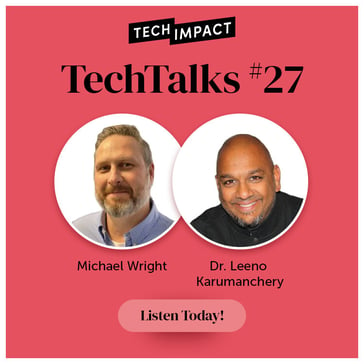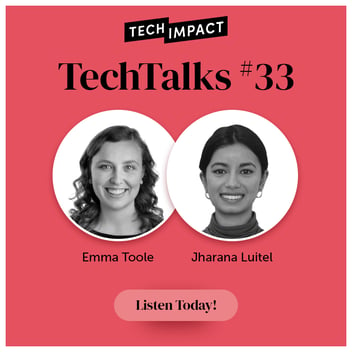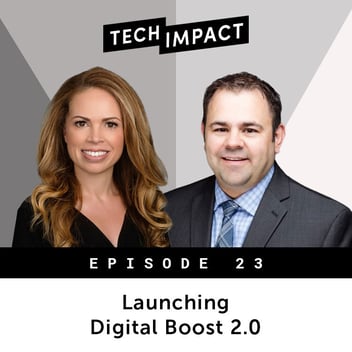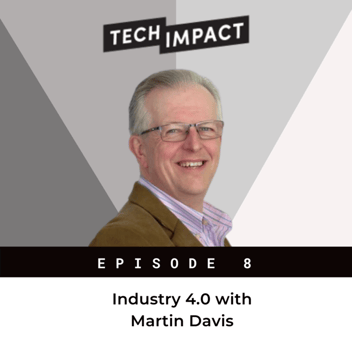EPISODE # 27 Designing Diverse & Inclusive Workplaces
TechImpact

In 2017, when MESH Diversity went to market with a software platform to measure and promote workplace diversity and inclusion, many people could still turn a blind eye and live in denial of systemic racism and privilege.
George Floyd’s murder changed that.
“It was just an absolute earthquake, a sea change that changed the world,” says Dr. Leeno Karumanchery, co-founder and head of behavioural sciences at MESH Diversity. “A whole pile of good, ethical, moral, decent people just went, ‘Oh my god, this is actually real, and it's actually happening. We have to do something.”
Trying to Fit In
Leeno grew up in the GTA, in predominantly rich, white neighbourhoods.
“I did what a good chunk of young kids of colour do,” he says. “You try to assimilate as much as possible.”
A couple of experiences in early adulthood would change his course, including a university class on race and racism led by a firebrand professor. At that time, “I felt as white as I could possibly be,” he says.
One day after class, he summoned the courage to approach her. “I think you’re racist towards white people,” he told her.
She looked at him kindly and said, “You know, you're either going to go through life with blinders on, or you’re going to see the world for what it is.”
It was a lightning bolt moment. Leeno was flooded with memories of racism from his own life, including one time a racial epithet was directed towards his mother.
Another day, he came home to his father watching Man of La Mancha. He was struck by Don Quixote’s famous soliloquy, about the madness of seeing life as it is, not as it should be.
“In that moment,” Leeno says, “I made a decision as to what I was going to do for the rest of my life.”

Paths Converge
Leeno went on to pursue studies on race and ethnicity culminating, in 2003, in a doctorate in Equity Studies from the University of Toronto. After graduation, he worked with corporations as a D&I consultant, but grew disheartened at how his work often didn’t endure a leader’s tenure.
Looking to do more, he realized there was a massive dovetail between emotional intelligence and the behavioural science he’d studied.
“And one of the really powerful things was being able to metricize it in a platform,” he says.
Enter Mike Wright.
A New Brunswicker with business and computer science degrees from UNB and a background in software, the pair met in Toronto, through a mutual friend.
The timing was perfect. Mike, who’d worked in various tech firms, wanted to build something from the ground up. And Leeno, a sociologist, definitely needed technical help developing the software for his diversity intelligence platform.
“That first iteration that he was handling on his own left quite a bit to be desired,” Mike says with a chuckle. He was initially drawn to the organizational development aspect of Leeno’s idea, but he quickly came to appreciate the true problem–subtle, pervasive racism and prejudice–that Leeno was trying to solve.
Once he saw it, he couldn’t unsee it.
“Oh my goodness,” he thought, “this is how the world works. I had no idea.”
A New Kind of D&I Model
Leeno and Mike knew their solution had to go deeper than the standard surface approach of so much D&I training, which often takes place in isolation, and in a way that creates resistance. And the “plugging holes” approach of simply hiring to fill minority gaps was not the solution, either.
Drawing on behavioural science, they worked for a few years to create a model that could not be “gamed.”
“The D&I issue is not a people problem; it’s a systems problem,” Leeno says. “And the only way you get systems like racism and sexism and heterosexism and ableism to work is you need good, kind, ethical, moral, decent people to take part in them without recognizing it.”
They knew they had to create a way of measuring D&I that went far deeper than surveys, to get at the truth about how people feel about themselves, their colleagues and their organization’s culture.
“Unless you're looking at the pieces that actually make a difference in terms of inclusive environments, and that has everything to do with behaviour, you're going to be stuck on this treadmill doing the same old, same old, and wondering why things don't change,” Leeno says. “That's why we developed a diversity intelligence platform.”
MESH in Startup Mode
In 2017, they went to market.
It was a classic startup with just a few employees. And while D&I was gaining interest in boardrooms and corporate Canada, it was a tough sell.
Back then, people were just starting to think about D&I. Today, in the wake of a series of profound social movements around racism, diversity and privilege, the context has transformed.
“Our approach, our messaging hasn't changed,” Mike says. “What's changed is how people hear it.”
MESH Diversity works on a few levels. The first step is creating baseline metrics on safety, belonging, and inclusion and providing those metrics on an ongoing basis so organizations have actionable insights at the individual and the team level. It examines behaviours around communication and civility, for instance, through a D&I lens.
Along with an all-staff introductory module to get the team on the same page, MESH has an inclusive leadership training program, power dynamic modules for leaders to go deeper, and ongoing training to stay the course.
The programs are all based on behavioural science and a belief in the inherent goodness of people. All of its programs are modularized, and designed to be seamless.
“This is no different than any other large implementation that you're doing in an organization,” Mike says. “It really is designed to be a system that can be embedded quickly and scale to where you want it to go.”
The D&I Future
Leeno can’t quite believe how far D&I has come.
“If you told me 10 years ago that we would be working with large financial institutions and using words like racism openly with executive leadership, I would have had the biggest belly laugh you've ever heard,” he says. “Now, it's not just that we're having these real conversations. They're conversations that people want to hear, and want to do something about.That's an amazing change.”
He and Mike are energized about the future, when more and more companies see how healthy cultures, where minoritized people feel safe, welcome and valued, can unlock their full potential.
“Can you imagine how much innovation and productivity they're going to bring to the workplace?” Mike says.
For now, MESH is working to take its platform and training to as many organizations as possible.
“The end goal,” Mike says, “is to change the world.”
If anyone can, it’s these two socially motivated entrepreneurs. To check out our entire conversation, click here to listen.
DON’T MISS AN EPISODE.
Do you subscribe to the Tech Talks With Cathy Simpson podcast? If not, please do. Every week, my guests and I will be covering lots of different topics around innovation, technology and the future. Click here to listen and subscribe in iTunes. You'll find us on Spotify, Apple Podcasts, Google Podcasts, PodLink and everywhere else you enjoy podcasts.
And sign up for our newsletter to never miss an update.
Visit Techimpact's website here
.png?width=600&height=187&name=Untitled%20design%20(2).png)


